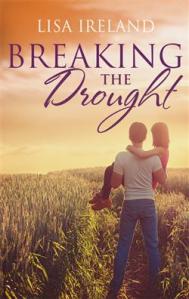by Lisa Ireland
When I read romance I find myself reaching for certain storylines over and over again. I love a good reunion story, and I’m a sucker for ‘best friends to lovers’, but my absolute favourite trope is ‘fish out of water’. Whether it’s a novel, a movie or a TV show, when the main character finds herself in unfamiliar territory—a stranger in a strange land, so to speak—I’m hooked.
If you grew up in Australia in the 1980s like I did, it’s a fair bet you’re familiar with the TV show A Country Practice. Molly Jones, the quirky city girl who moves to the country with her husband, is one of my favourite TV characters. Molly is a classic example of a fish out of water. Her romance was not with a man but with the town of Wandin Valley. She was in love with her new home, but the townsfolk were not in love with her—at least not at first! Molly’s antics got her into trouble at times, but eventually her big heart won over the people of Wandin Valley (and the rest us watching on at home!).

A Country Practice wasn’t the first fish out of water story I fell in love with. That honour would have to go to The Sound of Music. Who could possibly resist the story of a naïve almost-nun thrust into the world of a wealthy family? Maria might have been out of her depth at first, but we all knew the captain was falling for her despite her penchant for dressing his children in discarded curtains.
As a reader or viewer, I love these stories because I can often identify with the main character. Who hasn’t found themselves in the position of being the odd one out, struggling to fit in somewhere they didn’t belong? As a writer I find the fish out of water trope loads of fun. Putting a character in an unfamiliar setting provides instant conflict and also the opportunity to provide the reader with some comic relief from the drama unfolding.
In my debut novel, Breaking the Drought, city girl Jenna is a fish out of water, struggling to survive a week in a tiny country town. Poor Jenna, I really put her through the wringer in my story. She has to face some hard realities of country life (and she gets to reap some of the rewards too, of course!) Here’s a snippet of Jenna’s arrival in town, as seen through Luke Tanner’s eyes:
For the first time in his life he noticed a pair of women’s shoes. Bright orange platforms made their way out of the yellow Volkswagen as he approached. The shoes were fastened to the wearer’s feet by the tiniest of straps. Luke stared at them, wondering how anyone could manage to stand upright, let alone walk, in anything so impractical.
 When the car’s occupant emerged, Luke found himself transfixed. The shoes belonged to the most extraordinary woman he had ever seen. She wore a tiny pair of shorts and some sort of fancy cape thing as a top, the likes of which Luke had never encountered. Her clothes certainly weren’t like anything he’d ever seen Maggie wearing, or any of the local women for that matter.
When the car’s occupant emerged, Luke found himself transfixed. The shoes belonged to the most extraordinary woman he had ever seen. She wore a tiny pair of shorts and some sort of fancy cape thing as a top, the likes of which Luke had never encountered. Her clothes certainly weren’t like anything he’d ever seen Maggie wearing, or any of the local women for that matter.
She pushed her large framed sunglasses on top of her head and stared back at him.
‘Can I help you?’ she asked.
Inexplicably his pulse quickened as she spoke. ‘I was just admiring your…shoes.’
‘Jimmy Choos.’
‘I’m sorry?’
‘I picked them up on my last visit to New York. Don’t think they make them in…’ her gaze shifted to his feet, ‘cowboy size.’
Inappropriate footwear is the least of Jenna’s problems as she struggles to reconcile her growing feelings for Luke with her reluctance to live in his hometown. Despite her head telling her it will never work, her heart has other ideas.
Because I love this trope so much I’ve just written another fish out of water book. Honey Hill House is part of a three-book series set in the fictional town of Dulili, New South Wales.
Despite being a city girl, Bea Elliott is confident of making a go of country life when she moves into Honey Hill House. Her neighbor Callum ‘Mitch’ Mitchell, is not convinced she has what it takes to survive small-town living.
Here’s a snippet of their first meeting.
Mitch nodded. ‘Yeah, it’s going to take a bit to fix this place up. Mum says you’re planning on turning it into a B&B.’
‘Yeah, something like that.’
Something like that? Didn’t she know? What was the committee thinking, giving Honey Hill House to a girl who looked like she’d be more at home on a commune than running a small business? Beatrice Elliott mightn’t look the way he’d expected but so far she’d done nothing to contradict his prediction that she wouldn’t last six months in Dulili.
This was such a fun book to write and I loved collaborating with fellow Escape authors, Jennie Jones and Catherine Evans, whose books, A Heart Stuck on Hope and The Healing Season, complete the series.
I’m always looking for a good fish out of water book to read so if you have a suggestion drop me a line in the comments.
Good fences make good neighbours, but in Dulili it seems like barriers might instead be breaking down…


 Brothers of the Vine
Brothers of the Vine Forever Evermore
Forever Evermore Women of W.A.R.
Women of W.A.R.